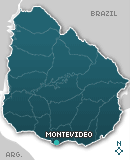Tours and Activities:
Keep on Dancing!
Pablo Etchevers Pablo EtcheversLas Llamadas (the Calls) are the largest popular celebrations in Uruguay. Every year in February, Montevideo is ornamented for candombe and comparsas to take hold of the neighborhoods of Sur and Palermo.


Call Me and I Will Go Outside
Like every year, the carnival starts early in February. This is the most popular celebration in the country. But before carnival starts, the poorest neighborhoods in Montevideo organize the so called Desfile de Llamadas (the Calls Parade). A story that began hundreds of years ago in Africa and reached these Uruguayan lands today is exported to the world as a fully recycled event.
History goes that during the days of the Spanish colony, many African men and women were brought to America as slaves in order to fulfill tasks at the houses of the most remarkable families in Montevideo.

When slavery was finally abolished, these Uruguayan citizens began to form new groups and thus they gave shape to the neighborhoods popularly referred to as "Negro neighborhoods", among which Sur and Palermo stand out.
Candombe was the rhythm that not only joined them together but also reminded them of their African past and held them close to their origins, to their history. "Playing the drum” (which derives from the African word “tangó”) used to be something more than making noise or music, it meant getting close to their people. In addition to using the drums to call one another (thus giving origin to "the calls"), it was useful to get together in groups and remember religious and warfare worships, something that still remains when they heat their drumheads around the fire.



We are Much More than Two
The comparsa, which parades on every Llamada, is made up by an endless number of members who give free rein to the carnival joy. This starts early in the evening and ends at dawn.
These parades take place during two days. In the past, all the comparsas used to parade on the same day, but due to the large number of groups that want to take place, the organizing authorities have resolved to split it into two nights and to present it before an ever increasing audience.
During the parade, the first feeling experienced by the audience is the overwhelming sound of the drums, which is heard from hundreds of meters away before the banner distinguishing the group may be even seen.

Behind the banner, there appear the large flags brandishing the colors of every group. After that, dancers holding figures, flags and dummies reminiscent of stars and half moons may be seen. They bring along part of the African religion the natives used to practice before reaching the lands of the Río de la Plata (Islamic religion).
Finally, the Gramillero appears. This is one of the most attractive figures in the comparsas. This is the eldest member, who still dances with his years on his back and attempts to seduce the “Mama Vieja (Old Mamma) or Abuela” (Grandma), generally a black woman who, in spite of her age, moves her hips sensually and in a very feminine way.
Behind them, the typical characters, such as El Escobero (the Broom Man), la Vedette (the Female Star), el Bailarín or Bailarina (the Male or Female Dancer), are joined by more and more members of the dancing body and the best line of drums, also referred to as tamborileros.
For years, the first week in February has been the date chosen to enjoy this popular festival which manages to paralyze Uruguay and summons more and more fans of all races and religions.


© 2007-2026 Total or partial reproduction forbidden. Derechos de Autor 675244 Ley 11723


 See also:
See also: 



